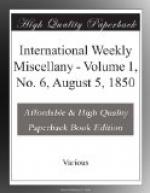Such was the usual tenor of the letters which Edward received during that period, His heart was full of anxiety—he read danger and distress in the mysterious communications of Ferdinand; and every argument that affection and good sense could suggest did he make use of, in his replies, to turn his friend from this path of peril which threatened to end in a deep abyss. He tried persuasion, and urged him to desist for the sake of their long-tried affection—but when did passion ever listen to the expostulations of friendship?
Ferdinand only saw one aim in life—the possession of the beloved one. All else faded from before his eyes, and even his correspondence slackened, for his time was much taken up in secret excursions, arrangements of all kinds, and communications with all manner of persons; in fact every action of his present life tended to the furtherance of his plan.
All of a sudden his letters ceased. Many posts passed without a sign of life. Edward was a prey to the greatest anxiety; he thought his friend had staked and lost. He imagined an elopement, a clandestine marriage, a duel with a rival, and all these casualties were the more painful to conjecture, since his entire ignorance of the real state of things gave his fancy full range to conjure up all sorts of misfortunes. At length, after many more posts had come in without a line to pacify Edward’s fears, without a word in reply to his earnest entreaties for some news, he determined on taking a step which he had meditated before, and only relinquished out of consideration for his friend’s wishes. He wrote to the officer commanding the regiment, and made inquiries respecting the health and abode of Lieutenant Von Hallberg, whose friends in the capital had remained for nearly two months without news of him, he who had hitherto proved a regular and frequent correspondent.
Another fortnight dragged heavily on, and at length the announcement came in an official form. Lieutenant Von Hallberg had been invited to the castle of a nobleman whom he was in the custom of visiting, in order to be present at the wedding of a lady; that he was indisposed at the time, that he grew worse, and on the third morning had been found dead in his bed, having expired during the night from an attack of apoplexy.
Edward could not finish the letter—it fell from his trembling hand. To see his worst fears realized so suddenly, overwhelmed him at first. His youth withstood the bodily illness which would have assailed a weaker constitution, and perhaps mitigated the anguish of his grief. He was not dangerously ill, but they feared many days for his reason; and it required all the kind solicitude of the director of the college, combined with the most skillful medical aid, to stem the torrent of his sorrow, and to turn it gradually into a calmer channel, until by degrees the mourner recovered both health and reason. His youthful spirits, however, had received a blow




